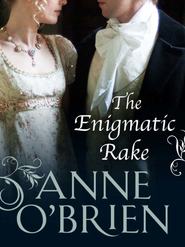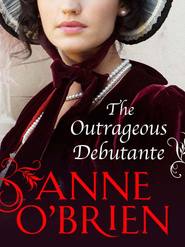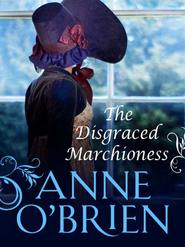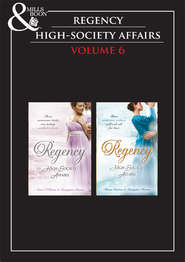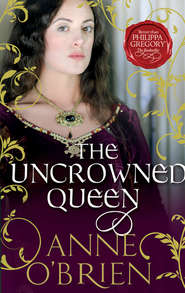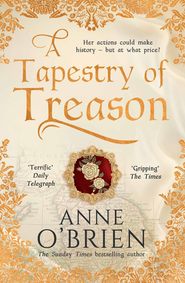По всем вопросам обращайтесь на: info@litportal.ru
(©) 2003-2024.
✖
The Forbidden Queen
Настройки чтения
Размер шрифта
Высота строк
Поля
‘Will you miss me?’ I asked, ingenuously. ‘Will you miss me just a little?’
He looked surprised. ‘Of course. Are you not the bride I always wanted?’
‘I do hope so,’ I replied.
‘You are, without a doubt.’
With a kiss to my lips, a smile and a graceful bow, at odds with his informal chamber robe, Henry left me holding tight to his assurances. As it must with any woman, it crossed my mind: did Henry, handsome and powerful, perhaps have a lover? Did he go from my bed to the arms of one of the palace servants who could entice him with sharp wit and languorous caresses?
I did not think so; I had no earthly rival. I had to fight against a God-ordained obligation to England and Henry’s vision of his country as the pre-eminent power in Europe. I did not think I would ever emerge the victor in such a contest.
Holy Mother, have mercy on me. At my prie-dieu I prayed harder than I had ever prayed. If I carried the heir he so desperately desired, Henry might acknowledge me as part of his dream for the future, rather than as a burden to be shouldered or put aside as time and necessity dictated.
‘How does a woman fall for a child?’ I asked. Alice’s much-vaunted feverfew was not working. ‘What must I do to ensure my fertility?’
What a collection of raised brows and rounded mouths. Prayer was good, but I knew I must take counsel elsewhere. I steeled myself to it.
There was a silence in the artlessly decorative group of damsels, stitching and reading in the late afternoon.
Had I shocked them? Did English Queens not ask such intimate questions? I felt my face colour with heat but my need was greater than my shame. They—my damsels—had been universally cool since our establishment back in their own milieu. Poised, at ease in the ceremonial ways of the court, I thought that they scorned my lack of aplomb. Respectful for the most part, for they would not deign to be less than deferential towards the King’s wife, there was no warmth for their foreign mistress. I found them hard to read. I had made no friends there. With no practice in making friends, I had no pattern of experience to use to court and win affection.
But this was urgent. I needed advice.
Meg pursed her lips. ‘Your hips are very small, my lady, for sure. It can make childbearing difficult.’
My hands clenched into fists, well hidden in the soft silk of my skirts. So the fault was mine that I did not conceive. As perhaps it was, but I heard the disdain for my failure behind the carefully phrased fact.
‘His Majesty is capable, my lady,’ Beatrice observed. They would know how often Henry came to my bedchamber, of course.
‘Yes.’ The heat in my face became more intense.
Joan, the youngest of my damsels, with a kinder eye, spoke up. ‘My sister says that if you grind the dried testicle from a wild pig into powder, mix it in wine and drink it, the result is excellent.’
‘Do we have a testicle of a wild pig?’ I heard myself asking, unnerved at the advice.
A silence. A pause. Then my damsels erupted into laughter, with an edge that was, to my mind, not kind at all. I thought they looked at me with pity, even when Alice took them to task.
‘I have heard of such a nostrum, Joan, but that was not helpful. Unless you are volunteering to go and kill a wild pig for us? And you can take Beatrice with you. Her scowl will kill a boar at twenty paces. I think we can do better. If you carry a walnut in its shell, my lady, it will strengthen your womb and aid fertility.’
‘If you eat walnuts, it is said to cure madness.’
I froze, heated skin now pale and cold at this unexpected wounding. Anguish ripped through me that Cecily would make it so personal an attack. Could they be so deliberately cruel? I turned to her, prepared to defend my father.
‘Enough, Cecily!’ It was Beatrice who came to my aid. ‘Your manners are not what your mother would wish for you. I suggest you say a rosary before dinner and pray to the Holy Virgin for humility.’
While to me, with compassion in her face, Alice advised, ‘We will tuck some leaves of polygonum bistorta into your sleeves. And if you will eat some of the seeds of the Helianthus flowers, my lady…’
‘And you, Cecily, might pray that fragility of mind never touches one of your family.’ Beatrice continued her admonitions to my pert damsel. But I knew that Beatrice’s loyalty was to Henry and the as yet unconceived heir rather than to me.
‘Forgive me, my lady.’ Cecily’s eyes dropped before mine.
‘Thank you,’ I said to Alice, smiling at Beatrice, hanging on to dignity.
‘It’s early days,’ soothed Alice. Then added sternly, ‘And this flock of clucking fowl should know better than to mock a woman in such need.’
My damsels sniffed at the reprimand and laughed in corners, even when they knew I would hear them.
No, I made no friends with my ladies in waiting.
Perhaps it was at Leicester where I eventually caught up with Henry on his progress. Or perhaps it was York. Or even Beverley. Or perhaps I did not actually go to Beverley. I remember Henry enveloping me in his arms, lifting me from my litter, welcoming me with gratifying heat, but in the end one town merged with yet another, towns I did not know and have little memory of, where the inhabitants thronged the streets to cheer us, fêting us with banquets and entertainments and lavish gifts of gold and silver. So pleased they were to see and entertain their King after so long an absence.
And his new French wife, of course. Henry continued in good mood, receiving the professions of loyalty with gracious words, before demanding taxes and reinforcements for the renewal of war. I knew the direction of Henry’s thoughts. How could I not, when boxes of documents accompanied us, packed into carts that lumbered along in our wake? But Henry smiled and bowed and was careful to wish me good morning and ask after my health.
After my failure to fulfil his hopes on that last night in London at the Tower, Henry occupied my bed with flattering frequency, his desire for an heir taking precedence even over the Exchequer rolls. With tender kisses and chivalrous consideration, he put me at my ease, and I felt more attuned to Henry than I had ever been.
‘I am proud of you, Katherine,’ he said more than once when I had helped him charm the citizens of some town into subscribing to the royal coffers.
‘That pleases me,’ I replied.
Henry kissed me on my mouth. ‘I knew you would be an excellent wife.’
And my heart kicked against my ribs in a not unpleasant reaction. This was the closeness I had looked for. When he took the time to escort me through the fine streets of York and into the magnificent Minster, I could not believe my good fortune. Henry was indulgent and I relaxed when he held my hand and introduced me as his incomparable wife.
But at Beverley—or perhaps it was York—there was an unnerving change. I saw the exact moment it happened.
We had taken possession of yet another suite of chilly and inconvenient rooms in the accommodations belonging to the church, and letters arrived at daybreak as we broke our fast after Mass. There was nothing unusual in this to draw my attention from the prospect of two hours watching the craftsmen of the town perform yet another play of their own devising. Noah and the Flood, and the whole array of animals—or at least a goodly sum of them portrayed by the masked children of the guild families.
Henry opened the documents one after the other, one hand dealing efficiently with bread and beef, the other smoothing out the well-travelled parchments. He read rapidly, with a brief smile or a grunt and a nod, pushing them aside into two neat piles, one for immediate attention, the other for disposal. Henry was nothing if not meticulous.
And then he hesitated. His hand clenched the letter he held. Very carefully he placed the bread and the letter on the table, and brushed the crumbs from his fingers. His eyes never left the written words.
‘What is it?’ I asked, putting down my spoon. The stillness in him was disquieting.
I might not have spoken. Henry continued to read to the end. And then started again at the top. When it was finished, he folded the document and tucked it into the breast of his tunic.
‘Henry?’ By this time I had progressed from the formal address of ‘my lord’.
Henry slowly raised his eyes to my face. His expression did not change by even the least tightening of muscles but I thought the news was ill. The opaque darkness of his eyes, reminiscent of the dark pewter of the puddles in the courtyard of my childhood home under a winter sky, told of something that had displeased or worried him. His lips parted as if to speak.
‘Is it danger?’ I asked.
He shook his head. ‘No danger. No.’ It was as if he shook his reactions back into life, to re-engage his senses. Bread and meat forgotten, he clenched his hand round the cup at his elbow and gulped the last of his ale.
‘Is it bad news, then?’ For however much he might struggle to maintain it, something had unexpectedly shattered his impassivity.
Stiff-limbed, Henry stood. ‘We are expected to attend the mummers and official welcome this morning.’ As if I did not already know. ‘Be ready at eleven of the clock.’
He walked from the room with no further comment or explanation, my astonished gaze following him. And the day passed as so many before, with Henry the ultimate monarch, charmingly attentive to his loyal subjects, delighting them with his attention to their preparations but completely devoid of emotion. Noah’s ark might have sunk without trace and the animals met a watery death for all the enjoyment he had in it.






